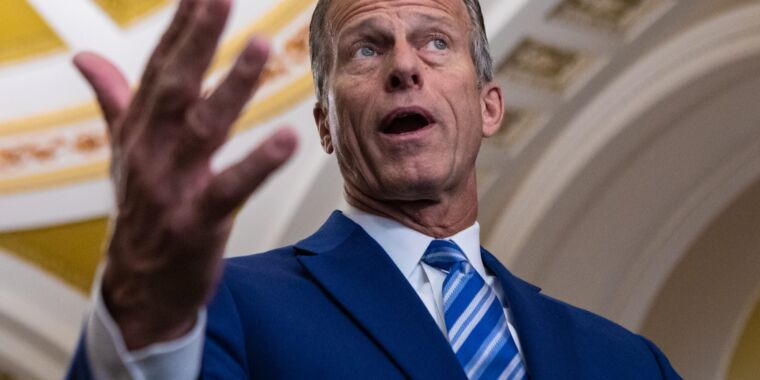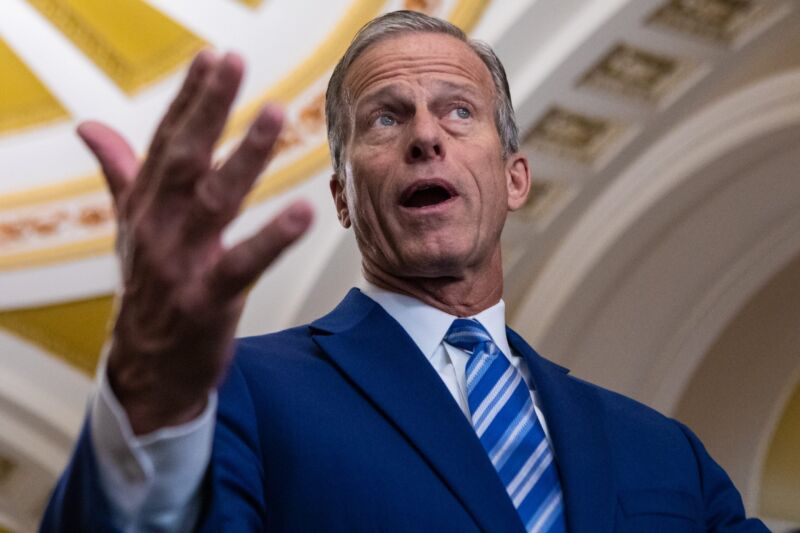Thune, Cruz complain that $30 discounts go to people who "already had broadband."

arstechnica.com
Republicans slam broadband discounts for poor people, threaten to kill program
Thune, Cruz complain that $30 discounts go to people who "already had broadband."
JON BRODKIN - 12/19/2023, 1:28 PM
Enlarge / Senate Minority Whip John Thune (R-S.D.) speaks to reporters after the weekly Senate Republican caucus lunch on November 14, 2023, in Washington, DC.
Getty Images | Anna Rose Layden
256
Republican members of Congress
blasted a program that gives $30 monthly broadband discounts to people with low incomes, accusing the Federal Communications Commission of being "wasteful." The lawmakers suggested in a letter to FCC Chairwoman Jessica Rosenworcel that they may try to block funding for the
Affordable Connectivity Program (ACP), which is expected to run out of money in April 2024.
"As lawmakers with oversight responsibility over the ACP, we have raised concerns,
shared by the FCC Inspector General, regarding the program's effectiveness in connecting non-subscribers to the Internet," the lawmakers wrote. "While you have repeatedly claimed that the ACP is necessary for connecting participating households to the Internet, it appears the vast majority of tax dollars have gone to households that already had broadband prior to the subsidy."
The
letter was sent Friday by Sen. John Thune (R-S.D.), Sen. Ted Cruz (R-Texas), Rep. Cathy McMorris Rodgers (R-Wash.), and Rep. Bob Latta (R-Ohio). Cruz is the top Republican on the Senate Commerce Committee, and Thune is the top Republican on the Subcommittee on Communications, Media, and Broadband. McMorris Rodgers is chair of the House Commerce Committee, and Latta is chair of the House Subcommittee on Communications and Technology.
The letter questioned Rosenworcel's
testimony at a recent House hearing in which she warned that 25 million households could lose Internet access if Congress doesn't renew the ACP discounts. The ACP was created by congressional legislation, but Republicans are wary of continuing it. The program began with $14.2 billion a little less than two years ago.
"At a hearing before the House Energy and Commerce Committee on November 30, 2023, you asserted—without evidence and contrary to the FCC's own data—that '25 million households' would be 'unplug[ged]…from the Internet' if Congress does not provide new funding for the ACP," the letter said. "This is not true. As Congress considers the future of taxpayer broadband subsidies, we ask you to correct the hearing record and make public accurate information about the ACP."
“Reckless spending spree”
The letter criticizes what it calls "the Biden administration's reckless spending spree" and questions whether the ACP is worth paying for:
It is incumbent on lawmakers to protect taxpayers and make funding decisions based on clear evidence. Unfortunately, your testimony pushes "facts" about the ACP that are deeply misleading and have the potential to exacerbate the fiscal crisis without producing meaningful benefits to the American consumer. We therefore ask you to supplement your testimony from November 30, 2023, with the correct information about the number of Americans that will "lose" broadband if the ACP does not receive additional funds, and correct the hearing record accordingly by January 5, 2024.
During the November 30 hearing, Rep. Yvette Clarke (D-N.Y.) said she will introduce legislation to re-fund the program. The ACP has widespread support from consumer advocates and the telecom industry. Additionally, the governors of 25 US states and Puerto Rico urged Congress to extend the ACP in a
November 13 letter.
The Biden administration has
requested $6 billion to fund the program through December 2024. Rosenworcel's office declined to comment on the Republicans' letter when contacted by Ars today.
Although the FCC operates the discount program, it has to do so within parameters set by Congress. The FCC's
ACP rulemaking noted that the income-eligibility guidelines were determined by Congress.
GOP claims “wasteful discrepancies”
Referring to the percentage of ACP recipients who previously subscribed to broadband, the GOP letter said:
According to your [Rosenworcel's] testimony, the Universal Service Administrative Company (USAC) found that only '20 or 22 percent' of ACP recipients lacked broadband prior to the ACP. Previous FCC surveys have found the number of non-subscribers served by the program to be even lower at 16 percent. The program's record of targeting taxpayer subsidies to consumers who already had broadband is further apparent in the FCC's enrollment numbers: The number of households in the ACP—approximately 22 million—far exceeds the 16 million unconnected households according to 2021 Census data.
Many of the current ACP recipients may have previously acquired broadband service through a predecessor discount program, so they weren't necessarily paying full price to begin with. The FCC implemented the $30 monthly ACP benefit in early 2022, replacing the previous $50 monthly subsidy from the
Emergency Broadband Benefit Program that started enrolling users in May 2021. Both programs were authorized by Congress.
The Republicans' letter criticized Rosenworcel's response to questions about how many ACP recipients previously had broadband. "When questioned about these wasteful discrepancies, you dismissed these concerns, claiming that Congress did not require broadband providers to ask subscribers whether they paid for broadband prior to the ACP program," the Republicans told the FCC chairwoman. "You claimed, therefore, that any data on the ratio of new subscribers to subscribers who previously paid for broadband prior to ACP was merely 'speculative.'"
The Republicans also urged Rosenworcel to provide data on "the number of households enrolled through each eligibility threshold, including through a participating provider's existing low-income broadband program," and "data on broadband adoption by first-time subscribers."
FCC Chair: “We’ll have to unplug households”
During her testimony, Rosenworcel said the ACP is providing discounts for over 22 million households and that the FCC expects that number to reach 25 million by April, based on enrollment trends. She also touted the ACP as "the largest broadband affordability effort in United States history."
"We have come so far, we can't go back," Rosenworcel told Congress. "We need Congress to continue to fund this program. If Congress does not, in April of next year, we'll have to unplug households and, based on current projections, it'll be about 25 million households we will unplug from the Internet in April."
The Republicans' letter called the 25 million figure "speculative."
"If you are going to dismiss concerns over the ACP's inefficiency as unproven (even where there is ample data underlying this fact), you should hold yourself to the same standard and avoid sweeping claims of effectiveness with no basis in data," the letter said.
The White House
said in October that the ACP has proven to be especially critical for rural, remote, and tribal communities. While the standard discount is $30 a month, the program provides
$75 monthly subsidies on tribal lands and in "high-cost" areas where the cost of building broadband networks is higher than average.
"Without this funding, tens of millions of people would lose this benefit and would no longer be able to afford high-speed Internet service without sacrificing other necessities," the White House said when it asked Congress for more ACP funding.









